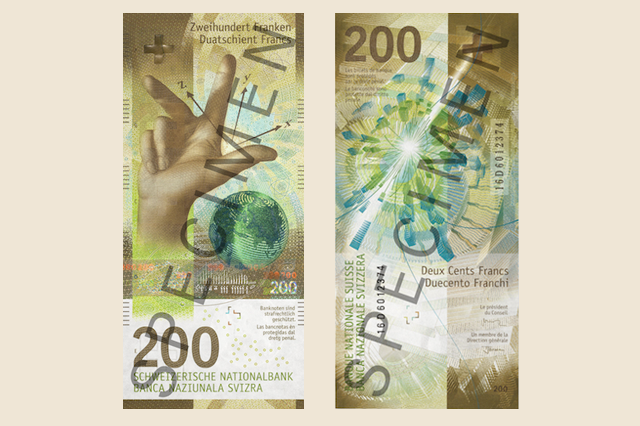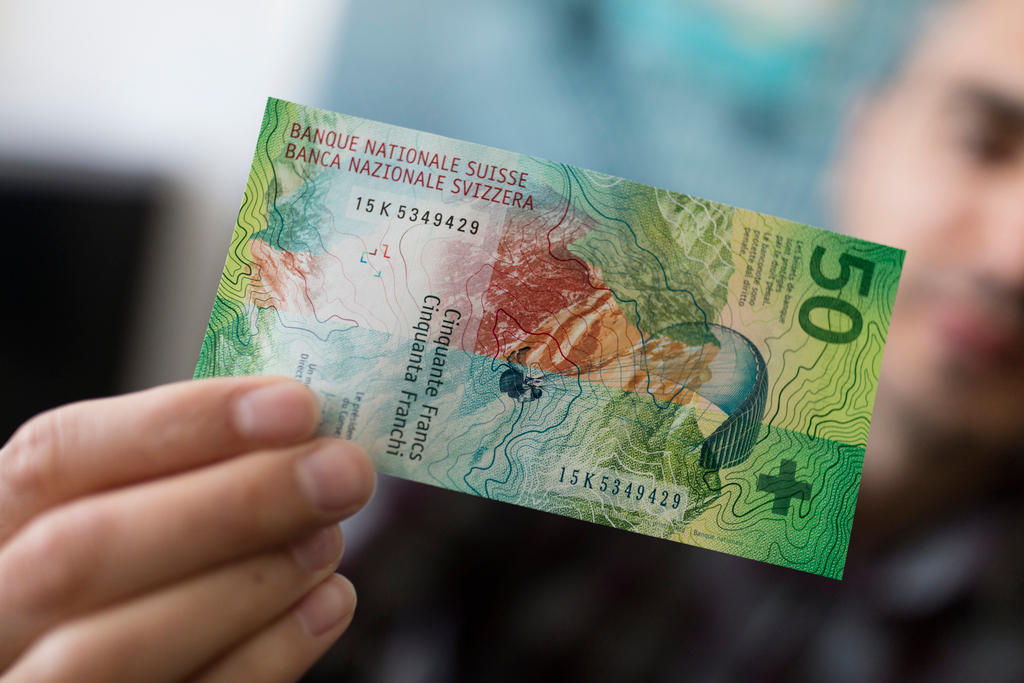
Why Swiss people use CHF200 banknotes

The Swiss National Bank is rolling out its newest banknote – and it’s one that people will actually use in the high street despite its high value.
Starting next week, Swiss ATMs, cash registers and wallets will carry the latest CHF200 note, which is worth about $202. Wallets, you ask? Indeed, especially those of people who forget to ask for small notes when withdrawing cash.
“The CHF200 note is a part of Swiss history. We’re used to paying with 200- or even 1,000-franc notes. And the stores say money is money,” points out Rafael DomeisenExternal link from the ZHAW School of Management and Law.
+ Why Switzerland still has a CHF1,000 note
He says that unlike a €200 note ($227), the risk that a CHF200 is fake is much lower, thanks especially to the security features of this latest series of Swiss banknotes. Unveiled on Wednesday, the CHF200 bill features images related to scientific exploration.

More
Swiss CHF50 named ‘Bank Note of the Year’
Zurich business psychologist Christian FichterExternal link agrees that the Swiss don’t worry much about counterfeit currency. But he thinks that even in its shiny new format, the CHF200 is outdated.
“The only real reason for having a CHF200 banknote is tradition. We’ve had this for a long time [since 1995] and don’t want to give it up,” Fichter tells swissinfo.ch. However, “try to pay for a coffee or any other cheap goods – and you’ll be greeted with a slight expression of unpleasantness,” says Fichter. This is because doling out change takes more effort with a high denomination note.
Because of this he says that “most people hate it when they withdraw CHF300 from the ATM and it gives them a CHF200 and a CHF100 note”. Domeisen disagrees: “I don’t care what comes out of the ATM.” Then again, he says he doesn’t use much cash.
“Paying with real cash becomes less important each year, so if you ask me, it’s time to get rid of the much-hated CHF200 note,” says Fichter.
Nevertheless, cash is still very popular in Switzerland, especially for transactions of up to CHF20. A studyExternal link released by Domeisen and his colleagues on Tuesday found that people in Switzerland use a debit card for 37% of their payments, cash for 36% and credit cards for 23%. On average, Swiss wallets contain CHF65 in cash.

Other cultures
In an informal survey, swissinfo.ch staffers shared insight into the cash customs of their native countries. In China, for example, the biggest banknote is 100 yuan (CHF15). But people tend to pay with their mobile phones rather than cash these days.
According to the Japanese department, people are comfortable carrying about 18,000 yen (CHF161) in cash – though men tend to carry more money than women.
The most popular Russian banknotes are 1,000 roubles (CHF15) and 500 roubles. A typical person would carry about 1,000 roubles, some more, and some almost nothing says the SWI Russian department.
In Brazil, the biggest banknote is the 100 real (CHF25) – and a person normally wouldn’t carry more than that, says the Portuguese department – noting that it’s quite dangerous to have more than that in towns like Rio de Janeiro.
The Swiss National Bank (SNB)External link will begin issuing the new 200-franc note on August 22. Following the 50-, 20- and ten-franc notes, this is the fourth of six denominations in the new banknote series.
The current banknotes will remain legal tender until further notice. The next denomination, the 1,000-franc note, will be presented on March 5, 2019. The last in the new series, the 100-franc note, will come out in autumn 2019.

More
Here’s what (the new) Swiss ten-franc note will get you

In compliance with the JTI standards
More: SWI swissinfo.ch certified by the Journalism Trust Initiative















![The four-metre-long painting "Sonntag der Bergbauern" [Sunday of the Mountain Farmers, 1923-24/26] had to be removed by a crane from the German Chancellery in Berlin for the exhibition in Bern.](https://www.swissinfo.ch/content/wp-content/uploads/sites/13/2025/12/01_Pressebild_KirchnerxKirchner.jpg?ver=f05a5a9c)















You can find an overview of ongoing debates with our journalists here . Please join us!
If you want to start a conversation about a topic raised in this article or want to report factual errors, email us at english@swissinfo.ch.